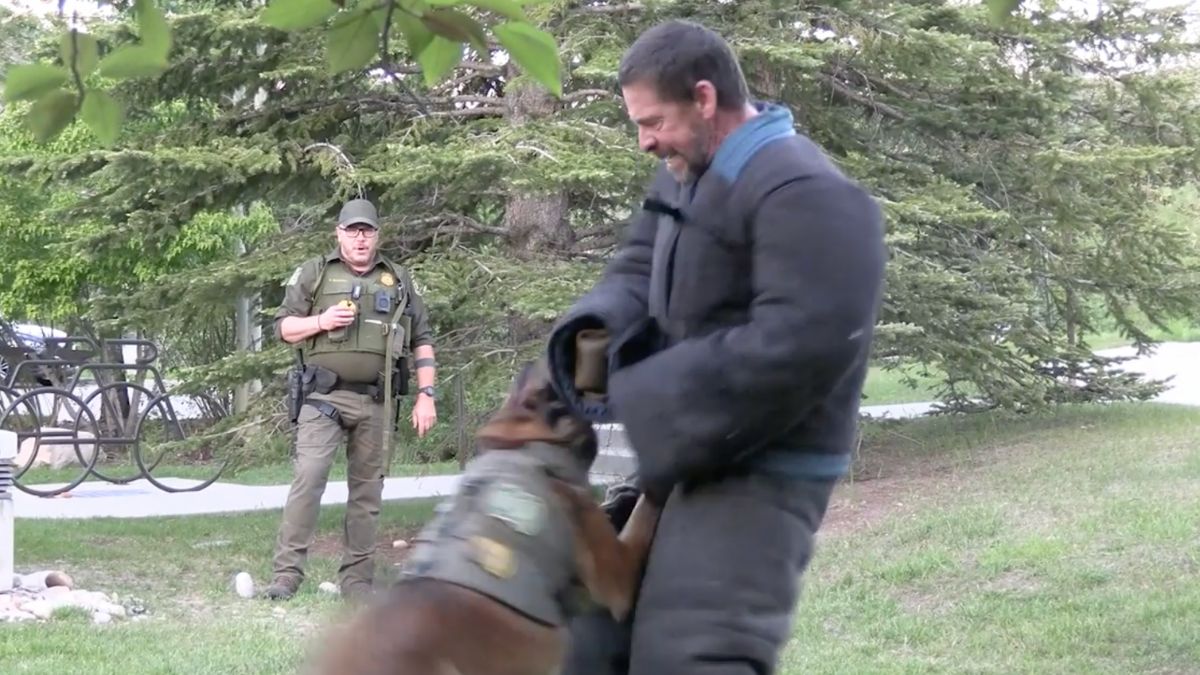Police & Fire
Beyond the uniform: Discover the realities of policing in Park City’s Citizen Academy

Park City Police Department officer Terry Knechtel was bitten by a law enforcement K-9 dog four times as part of a presentation for the PCPD's Citizen's Police Academy. Photo: Park City Police Department
PARK CITY, Utah — It’s that time of the year when the Park City Police Department is accepting applications for this year’s Citizen Academy. While not for the faint of heart, the program is an eye opening experience for those looking to see more behind the scenes of what it really means to be a police officer in this day and age.
Office Terry Knechtel has been with the Citizen Academy since day one, 14 years ago, and his fervor for this upcoming year is like he just started the gig. As a longtime officer of the Park City Police Department, he’s seen a lot and is eager to share the ins and outs of policing with this year’s class.
“There’s a lot of stigma and stereotyping and guessing of what we do, and if you listen to the news [or TV] more often than not, they don’t actually get it accurate or right,” Knechtel said. “So essentially we bring the community in and they get a chance to experience and learn about what we do that they normally wouldn’t be exposed to.”
Knechtel is so dedicated to the education of the students in the academy that each year, he dons a “bite suit” and lets the attendees witness a true police K9 dog attack.
“They wouldn’t actually get a chance to be close to a patrol dog,” Knechtel said. “Unless, of course, they’re involved in a situation where that dog is brought in. So, we make it easy so that they get a chance to watch just what that dog can do.”
In the beginning years of the program, and during the dog attacks, Knechtel recalls putting on a bite suit that was older and a bit more used than he was aware. Bite suits are actually made out of the same materials as fire hoses, so thick and heavy that it’s a workout just to put one on. After the attack, Knechtel said, “The handler didn’t tell me it was an old suit… I walked out, and I had bruises all over my arms because it’s not just the teeth, the jaws generate a lot of pressure. [These dogs are] also known as “malligators,” that’s why the military uses Malinois overseas.” But through training with these bite suits, Knechtel says he has no fear of dog attacks now; it doesn’t phase him.
The Academy has a total of 10 different classes going over the following pieces of Police training:
Drones
Crime Scene Investigation
Domestic Violence and Law
Jail Tour
Incident Command / Fire EMS
VIRTRA training (Attorney General’s office)
Traffic Stops / Traffic Law
Range / Gun Club
K-9 Unit
SWAT
Knechtel has a few personal favorites, outside of letting himself be attacked by a dog: the VIRTRA training and the SWAT unit. These parts of the program give some direct real-life experience for those looking for an adrenaline rush and to learn how to remain calm under extreme stress.
SWAT training includes a look into how the SWAT teams handle home invasions safely. This includes the use of a “flash bang,” which is extremely bright and at a volume level that Knechtel can’t even describe. SWAT uses these for distraction when going into homes so they can go in safely. But people don’t realize the intensity of this without witnessing it personally.
“The instructor tells you, ‘When it goes off, if you’re going to look at it, understand you’re not going to be seeing stars, you’re going to be seeing galaxies because this thing is bright, but open your mouth so that it’ll equalize the pressure that will go into your ears [from the sound],’” Knechtel explains.
The other significant ‘experience’ is the VirTra training, which is a virtual reality experience to give people a close-up view of an active shooter scenario. VIRTRA is a 300° movie theater where participants will go in, be hooked up to electrodes on their bodies, and run through different police scenarios. If participants get shot in the scene, they actually get shocked (like a paintball gun hit), but the scenario doesn’t end when shot; they have to continue to think and move through the situation.
“I’ve had attendees bow out and say, ‘I can’t, there’s no way I can do this.’ And I’m like, ‘What, why?’ ‘It’s just too high stress,’ and I totally get it,” Knechtel said, explaining the point of these interactive real-life scenarios is for pushing reactions, and to help control them. “They’re putting you through this to get you to a stress level to see how you react. It’s also to get you used to it… Don’t lock up, don’t curl up in the fetal position. ”
While the program is a great way to gain new recruits to the department, it’s also seen as the best PR they can get. “You folks are going to walk out of here with a better understanding of what it is we do. You are going to be our mouthpiece,” Knechtel said.
Knechtel urges the public to remember that, at the end of the day, cops are people too, and some days are more traumatic and emotional than people would think.
“Some of the calls… just what I’ve been on… that’s going to stay with me forever,” he said.
Just as anyone has a bad day, Knechtel regrets moments from some of his job encounters, saying, “I’m kicking myself for saying you should have been better, should have been nicer. And I can guarantee you that the next stop after that is going to be much better than the one prior because I learned from it.”
The program lasts 12 weeks, including an introduction and graduation, with 10 class sessions. It starts May 1, and applications will be accepted until it fills up. Twenty will be accepted into this year’s program. The program accepts those 18 years and older, and a background check is required.
To apply for the Citizen Academy, visit the Park City Police Department website. For any direct questions, Officer Knechtel can be reached at 435-615-5500.


















